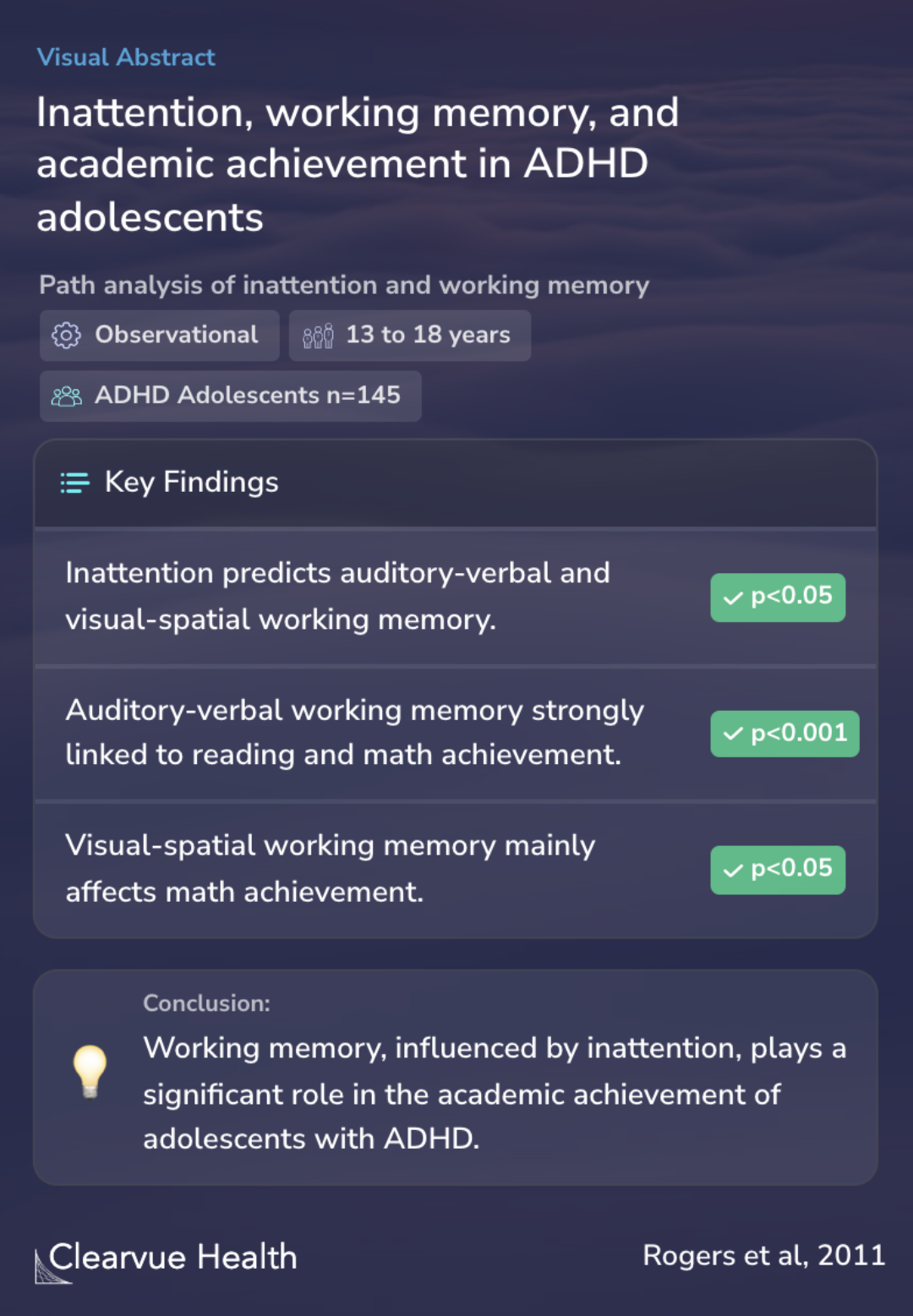Inattention, working memory, and academic achievement in adolescents referred for attention deficit/hyperactivity disorder (ADHD)
Inattention, working memory, and academic achievement in ADHD adolescents
Maria Rogers, Heungsun Hwang, Maggie Toplak, Margaret Weiss, Rosemary Tannock

Objectives
The objectives of this study were to explore the role of inattention and working memory in predicting academic achievement among adolescents. This study aimed to understand how these factors interact and influence educational outcomes in this population.
This study investigated the role of inattention and working memory in predicting academic achievement in 145 adolescents aged 13 to 18 referred for attention deficit/hyperactivity disorder (ADHD).
Methods
Path analysis was utilized to delve into whether auditory-verbal and visual-spatial working memory could be mediators in the relationship between classroom inattention symptoms and achievement outcomes. This approach aimed to provide a clear picture of how these cognitive processes are interconnected in adolescents with ADHD.
Path analysis was used to examine whether auditory-verbal and visual-spatial working memory would mediate the relationships between classroom inattention symptoms and achievement outcomes.
Results
The study revealed that behavioral inattention significantly predicted auditory-verbal and visual-spatial working memory performance. Notably, auditory-verbal working memory was strongly linked to achievements in reading and mathematics, whereas visual-spatial working memory mainly influenced mathematics achievement. The analysis suggested that these working memory variables partially mediated the path from inattention symptoms to reading, but this was not the case for mathematics.
The article further emphasizes that behavioral inattention was associated with both auditory-verbal and visual-spatial working memory. It's interesting to note that while visual-spatial working memory was linked to math achievement, it did not show a significant association with reading. In contrast, auditory-verbal working memory demonstrated a strong effect on both reading and mathematics achievements.
Behavioral inattention significantly predicted both auditory-verbal and visual-spatial working memory performance. Auditory-verbal working memory was strongly associated with adolescents' achievement in reading and mathematics, while visual-spatial working memory was only associated with...
Conclusions
The study concludes that working memory, influenced by inattention, plays a significant role in the academic achievement of adolescents with ADHD. These findings imply that working memory is a critical risk factor for academic failure among adolescents facing attentional challenges.
These findings imply that working memory is a risk factor for academic failure for adolescents with attentional problems.
Key Takeaways
Context
The current study fits into a broader research landscape that explores the cognitive dimensions of ADHD and their impact on academic performance. For instance, Roth et al. (2004) examined the link between verbal learning, working memory, and ADHD in adults, suggesting that difficulties in working memory and verbal learning in ADHD might stem from anxiety rather than cognitive organization challenges. This perspective complements the current study's focus on the role of working memory in academic achievement among adolescents with ADHD.
Similarly, the study by de S Costa et al. (2014) highlighted the influence of inattentive symptoms on the relationship between intelligence and academic performance in children, pointing to attentional difficulties as a more significant factor than intelligence in academic struggles. This aligns with the current study's emphasis on inattention and working memory as key factors in academic achievement, thereby enriching our understanding of ADHD's impact across different age groups and cognitive processes